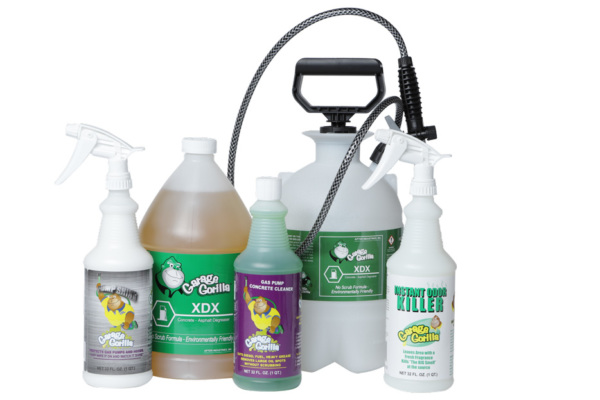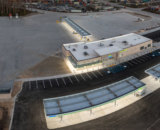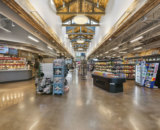COVID-19 has created a new focus on cleaning and sanitizing, and customers have increased expectations that likely will continue long after fears of the new novel coronavirus have faded.
“I think there are a lot of things that will be the new norm or continue on,” said Don Quinn, vice president of member services at NATSO.
Vicky Hendon, owner of Danny’s Big Rig Resort in Phoenix, agreed. “Drivers definitely appreciate the measures we have taken to make everyone on property feel more comfortable during their visits. We plan on continuing to implement those provisions permanently,” she said.
Proven Cleaning Techniques
Most locations already have an effective cleaning checklist, which they can continue to follow, Quinn said. He added that cleaning frequently touched items, such as door handles, key pads, cooler doors and bathroom doors, has become a priority, and he expects that to continue. “I would want to make that cleaning very visible to my guests,” he added.
Hendon said the location is known across the driver community for its clean restrooms and impeccable showers. “Our company’s commitment to cleanliness is what set us apart from our competition prior to the pandemic and will be our biggest strength as we emerge,” she said. “We have always prided ourselves on the level of service that we provide our guests.”
Scott Apter, president of Apter Industries, said employees at most locations have the existing skillsets needed to clean stores, but the key is to give employees materials that are easy to use and not too complicated. “The product has to perform. If you give your employees product that performs, they’ll do the work,” he said.
Different products have different functions. For example, when wiping down touch points, Apter said it is important to use a product that kills the new novel coronavirus. “EPA has a list, and one of our cleaners is on it,” he said, adding that a lot of operators have been wiping areas down with a third-sink, final-rinse sanitizer, but that isn’t the most effective cleaner for high-touch areas.
For a deeper clean, Apter suggests employees clean as though they are doing a store reset. “When you do a store reset, you take everything down and spray and clean the shelves, clean the counters and wipe everything down,” he said.
Diesel Nozzles
Quinn said traditionally diesel nozzles haven’t been cleaned as often as gasoline nozzles, but that has changed for many locations that now wipe them down regularly. Some locations have started offering nitrile gloves or inexpensive gloves food handlers use. “You could make those available on the gas and diesel islands,” he said. “It shows your customers you care about them.”
Sean Flynn, general manager of Flynn’s Truck Stop, installed GasMitts from United Sign at his gas pumps. “They are disposable clear mitts that my customers can use to provide a barrier to touching anything. We are going through about four boxes a week, so it is an added cost, but our customers initially were really happy with them,” he said.
A Focus on Cross Contamination
Quinn said there are little things locations can do to prevent cross contamination. For example, use only blue rags for food service and red rags for restrooms. “You can tell at a glance that one would cross contaminate the other immediately,” he said.
Protective Measures
Some locations added plexiglass in front of cashiers. “That may not be a bad new norm to help protect your people even during a normal cold and flu season,” Quinn said.
Flynn installed plexiglass barriers after seeing them on NATSO’s blog. (Visit How to Add Plexiglass to Your Transaction Counters to view the blog post.) Flynn’s Truck Stop also reconfigured its checkout area and marked out lines six feet apart and changed the way customers queue so that people weren't bunched together.
UV Lights
Quinn said UV lights that are placed inside of HVAC units to kill viruses and bacteria could provide added peace of mind to operators and their staff. “You could advertise that, at least internally, to your employees so they know that you’re cleaning the air,” he said.
Flynn installed UV light/HEPA filter units on its HVAC ducts in March. Flynn said the units were easy to install. “Basically, you need to cut a spot in an air return and bring power to it,” he said.
Flynn said the HEPA filters do need to be changed, depending on level of particles in the air. “I am not sure how long the lamps will last, but you can visually check the units to see if the lamp is on,” he said.
The initial install of the HEPA filters in some of Flynn’s offices was done before there was any lockdown and before there was any definite proof that the coronavirus was airborne. “We had to source air registers made for ‘clean rooms,’” Flynn said. “You can't put them everywhere because that would change the air balance in your HVAC system.”
Flynn said he hasn’t touted the benefits to his customers. “I'm not comfortable saying anything definitive about them because I'm not a scientist, but privately I let my employees know what we were doing. Their job dealing with customers right now or coming into the office is stressful enough, and I hoped that by letting them know we were trying to think outside of the box and be proactive it would help,” he said.
New Products
Customers may be more interested in wiping down and cleaning their own vehicles and trucks, and Quinn recommended locations carry products such as sanitizing wipes once they become available again. “People aren’t going to come into your location looking for Clorox disinfecting wipes, but if they see them and they are a good price, they will grab them. You could have a bin of them near the door and promote them as an impulse buy,” Quinn said.
Subscribe to Updates
NATSO provides a breadth of information created to strengthen travel plazas’ ability to meet the needs of the travelling public in an age of disruption. This includes knowledge filled blog posts, articles and publications. If you would like to receive a digest of blog post and articles directly in your inbox, please provide your name, email and the frequency of the updates you want to receive the email digest.


